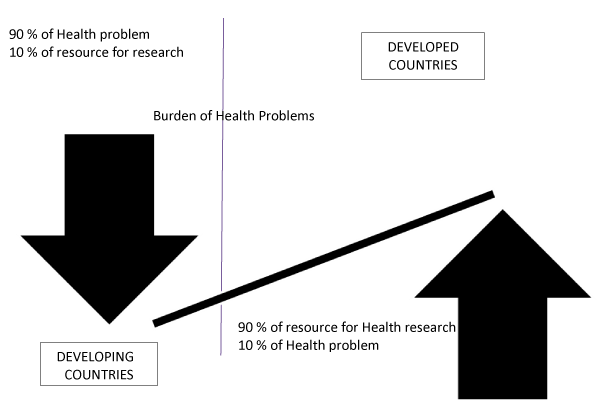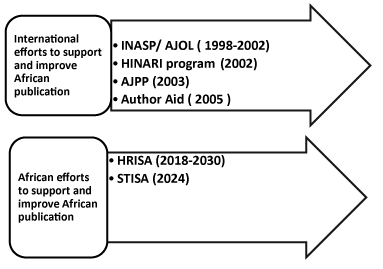Annals of Bone Marrow Research
Health research production in developping countries/africa
Aisha Nasef1* and Adel El-Taguri2
2National Center for Accreditation of Health Establishments/ Libya
Cite this as
Nasef A, Taguri AE (2020) Health research production in developping countries/africa. Ann Bone Marrow Res 5(1): 006-010. DOI: 10.17352/abmr.000006Qualified researchers from Africa, who worked in team abroad are competent. But, they cannot reproduce and develop works started abroad after returning back to home countries.
In this article we will list briefly the different underlying causes, challenges, consequences and future aspiration.
Introduction
Researchers share the results of their work through publication in peer-reviewed journals, and participate to the scientific progress and advances in health care by providing evidence based policies.
Western europe led the world on infectious diseases and in cardiopulmonary medicine publication, whereas the United States ranked first both in quantity (49.1%) and quality of publication in preventive medicine, public health and epidemiology [1]. Developing countries are not able to contribute to knowledge input as compared to developed countries. Screening of more than 4000 research articles published over 13 years in nine international peer-reviewed journals showed that investigators from high-income economies (developed countries) contributed to almost all the publications, and those from developing countries contributed to (3.9%) of publication. There were no publications at all from around 80% of 154 developing countries, and most publications from developing countries are published by China (15.4%) followed by Turkey and South Africa [2].
Burden of disease in the world falls on developing countries, and chronic non communicable disease such as diabetes and obesity can no longer be considered as diseases of developed world. Impact and burden of these diseases along with tuberculosis, AIDS and Malaria are more common in or limited to developing countries. So it would be reasonable to expect that more researches are needed in these countries. However, a retrospective survey to examine the contribution of the developing world to medical literature in a calendar year, showed that there was non-satisfactory structure and non-objective based process in research projects with poor outcome. The survey categorized countries into four regions: UK, USA, Other Euro-American countries (OEAC) and rest of the world (RoW). The study found that average RoW contribution to research in all journals was 6.5%. There was a considerable variation between journals, where more than half (12%) articles from the RoW were published in Lancet. There was an involvement of authorship with developed countries in 68.9% of publication. In 10 % of original papers, the data was from RoW but not authors. There is a marked under-representation of developing countries in high-impact medical journals, where 90% of the world’s population lives [3,4].
African countries should assess the status of research within its borders, to be able to become a real contributors to scientific advancement on the world. It’s time for Africa to acknowledge the importance of research in facing next millennium challenges.
In this article, we would like to discuss current research status, challenges, and needed efforts to promote health research in Africa.
Current status in Africa
Health research challenges and needs in Africa have been well documented for many years [5-7]. Most countries in Africa had low levels of scientific activity and publications over the past decades.
The term 10/90 gap express the global imbalance whereby developing countries experiencing 90% of the world’s major health burden, spend only 10% of its resources for research. Less than 10% of the world’s biomedical research and development funds are dedicated to addressing problems that are responsible for 90 % of the world’s burden of disease, where 90% of the world’s population lives developing countrieslive [8-10] (Figure 1).
Poverty contributed to malnutrition, pollution,poor hygiene and sanitation, low immunity and increase of communicable and non-communicable diseases as well as psychological and behavioral problems. Poverty and health problems forming a vicious cycle. As reported by world health organization (WHO), 45%of diseases burden is present in poorest countries. Africa would need to be more committed for health status improvement by focusing on health research.
The limited number of citations of articles published by authors from developing countries, resulted in limited input toward the solution of global and national health problems and lack of best evidence published information [6]. This low scholarly output from Africa in many research fields attracted a considerable amount of international attention [11-13].
Challenge for Africa
In our experience, the current challenges in Africa, that resulted in scanty publication can be attributed to international and local reasons. International causes can be summarized in following factors. Text-Book.1 (International causes):
International causes:
• Lack of prioritization of world health problems by decision makers.
• Lack of adequate funding from international agencies.
• Funding offers are neither coherent, nor directed to competent users.
• Biased research topics determination.
• Limited transfer of know how, lack of transfer of subtle skills and implicit knowledge.
• Exclusive monopole of latest and advanceded technological tools.
• Donnation form funding agents to unvaild or incompetent user.
• Lack of comprehensive technical support and information access to African reseacrhers.
• Insufficient or incomplete training and weak peer networks of African researchers.
• Many journals from Africa are not indexed in Medline and not included in major databases.
• Un-indexed African journals would not get high quality manuscripts and is not going to be cited [6].
• Serious under-representation of Africans on editorial and advisory board in medical journals.
• Journals show little interest in the problems of the developing world, as they rely on reader-pay models and on advertisement.
• Bioethics journals remains mainly European and American
These factors are affecting research production from Africa [13-15].
Local factors resulted in scanty population in Africa can be summarized in general and personal causes Text-Book.2 (General causes);
General factors:
• Many African countries are fragile. They are either engaged actively in war or would be considered as a post-conflict zone, and are not suitable to perform research.
• Poor developing countries dispense money on armament and in management of blessed and displaced people rather than establishing suitable research envirornmemnt.
• There is no assimilation of the primordial role of research in problem solving by decision makers in most African countries.
• No strategy setting, no clear goals or objectives by academic and professional institute, neither by governmental and planning bodies.
• Universities are merely educational bodies, and had no true research culture.
• Research laboratories are poorly equipped.
• No access to career structure.
• Low number of tutors or supervisors.
• Link between research and academic reward (promotion) without specification or evidence based objectives had a negative impact.
• Few academics uses excuses of high teaching burden in universities that does not allow time for research and scientific writing.
• Lack of professionalism in local funding bodies.
• Other problem is absence of culture and guidelines of medical research ethics.
Personal factors resulted in scanty population in Africa can be attributed to following factors Text-Book.3 (Personal causes):
Personal Causes:
• Limited technical competency in scientific English writing.
• Uncertainty about journal options.
• High rejection rates and research wrong doing [16].
• Researchers in Africa are poorly paid, so they have to work in unrelated private practice to cover their needs [6]
• Brain drain and Immigration to countries which offer enough income (17).
• Researcheres have no financial support from their institutes or centers to pay publication fees, conference fees or visa and travel dispense.
• Need of descendants from African countries for visa, and refusal of visa issuing even for invited researchers is a problem for researcher from many of these countries.
All these factors have a negative impact and widen knowledge gap and prevent dissemination of information. These factors form a real obstacles for research progress.
A well designed questioner directed to all international and national stakeholders, and bibliometric studies are needed in order to eludicate the underlying factors for the current inconvinent situation of health researches. Africa as all developing country has difficult circumstances and challenges at international and national level. A by solidarity and team work, and intervention by comprehensive approaches at all levels are needed in order to contribute to solve Africa specific disease and health problems [18] (Figure 2).
Efforts to promote health research
Various global health organizations and alliances have called for both increased access and sharing of research data and primary publications [7]. Scientific journals editors tried to contribute by establishment of task force to foster local research capacity in developing countries by launching Author aid who prepare articles to disseminate local knowledge data and practice to set strategy and policy [15].
Another contribution was joining Health Inter Network Access to Research Initiative through WHO-supported HINARI program (7). It provides free access to developing countries with a gross national product (GNP) per capita below 1,000 USD.
Scientific publishing is undergoing significant changes due to the growth of online publications. The increase in the number of open access journals could disseminate scientific knowledge [15].
The International Network for the Availability of Scientific Publications (INASP), provides support for networking between information providers (developed) and users (developing) world through local partners by supporting indigenous research publications. African Journals On Line (AJOL) was launched in 1998 and over 8,000 people have registered to use AJOL in around 5 years [19].
The Program for the Enhancement of Research Information was formally launched in 2002 by INASP. It provides and supports access to international research information and promotes access to nationally published research.
African Journals Partnership Project (AJPP) was launched on 2003. It is funded by the National Institutes of Health with technical support from the editors of council of Science. This partnership aims to enhance “the quality and credibility of the African journals» and thereby attract high-level research.
However, Journal editors and publishers have shown a bias against publishing materials on the diseases of poverty from developing countries and failed to provide universal access to the scientific and medical literature as solicited [17,18,20].
Future aspiration
It is obvious that the current status of Africa needs an urgent intervention with proper actions. Unless major paradigm shift occurs in the socities such as aimed for “silencing the Guns 2020” initiative of Pan-African Parliament’s Peace Efforts and Interventions. A need for the recognition of the importance of the culture of solidarity among African countries should be instituted. Different and specific tailored solutions or approaches are needed for each underlying cause. Strengthening health research capacity in developing world and providing reasonable opportunities for publications are critical for medical science advancement.
We need a lot of efforts to change the existing cultures, and to tackle each contributing factor. Africa continent and individual countries need to set their research strategy, structure, style, values, resource and skills. Creation of research culture through raising decision-maker’s awareness is mandatory, along with allocation of financial, legal and administrative support. Collaboration and partenership with recognized international and national research centers to strengthen educational and training programs is needed.
Ethical guidelines for Health research are crucial. Promotion of ethical conduct of global health research in resource poor setting is needed [21].
Journals have to realize their potential in addressing global inequities. Editors can make an important contribution to these challenges by identifying gaps, weaknesses, and failures in scientific knowledge and convening partnerships to address them.
Africa can provide good quality medical researches despite having poor setting and weak resources for the time being. Perception of the actual situation and its impact are essential pre-requirements. Improvement needs multiple interventions at strategic, tactic and operational levels. Pan African organization and collaboration, as well as cooperation with developed countries, would be able to change the output of Africa health research.
- Falagas ME, Michalopoulos AS, Bliziotis IA, Soteriades ES (2006) A bibliometric analysis by geographic area of published research in several biomedical fields. 1995–2003. CMAJ 175: 1389–1390. Link: https://bit.ly/302hoL3
- Pascal Borry MA, Schotsmans P, Dierickx K (2006) Developing countries and bioethical research. New Engl J Med. 353:852-853. Link: https://bit.ly/3eIpmgt
- WHO UNAIDS (2009) Aids epidemic update 2009. Link: https://bit.ly/3cumyCm
- Sumathipala A, Siribaddana S, Patel V (2004) Under-representation of developing countries in the research literature: ethical issues arising from a survey of five leading medical journals. BMC Med Ethics 5: 5. Link: https://bit.ly/2zMvZjl
- Jones AC, Geneau R (2012) Assessing research activity on priority intervention for non-communicable disease prevention in low-and middle-income countries: a bibliometric analysis. Glob Health Action 5: 10. Link:https://bit.ly/3duD2vo
- Muula AS (2008) Medical Journals and Authorship in Low-income Countries. Croat Med J 49: 681–683. Link:https://bit.ly/2XtBtIs
- Voronin Y, Myrzahmetov A, Bernstein A (2011) Access to scientific publication: The scientist's Perspective. Plos ONE 6: e27868. Link: https://bit.ly/304nElQ
- Uthman OA (2008) Performance, Priorities, and future of biomedical research publication in Africa: Need for networks between scientists in developing countries. Pan African Med J 1: 5. Link: https://bit.ly/2XsbMbB
- Davey S (2004) The 10/90 Report on Health Research 2003-2004. Geneva, Switzerland: Global Forum for Health Research. Link: https://bit.ly/3gOIXxy
- Schotsmans, Dierickx K (2006) How international is bioethics? A quantitative retrospective study Pascal Borry*, Paul. BMC Medical Ethics 7-1. Link: https://bit.ly/3dsJJ1h
- Soteriades ES, Rosmarakis ES, Paraschakis K, Falagas ME (2006) Research contribution of different world region in the top 50 biomedical journals (1995-2002). Faseb J 20: 29-34. Link: https://bit.ly/36UhJ40
- Uthman OA, Uthman MB (2007) Geography of Africa biomedical publication: an analysis of 1996-2005 pubmed papers. Int J Health Geog 6: 46. Link: https://bit.ly/3duWIiH
- Keiser J, Utzinger J, Tanner M, Singer BH (2004) Representation of authors and editors from countries with diferent human development indexes in the leading literature on tropical medicicne: survey of current evidence. BMJ 7450: 1229-1232. Link:https://bit.ly/2MnuMBz
- Mahawar KK, Malviya A, Kunair G (2006) Who publishes in leading general surgical journals? The divide between developed and developing world. Asain J Surg 29:140-144. Link:https://bit.ly/3eJox7b
- The PloS medicine editor (2006) How can biomedical journals help to tackle global poverty. PloS Med 3: 380. https://bit.ly/2U2TgV5
- Adeleye AA, Adebamowo CA (2012) Factors associated with research wrongdoing in Nigeria. J Empir Res Hum Res Ethics. 7: 15-24. Link: https://bit.ly/2MlfsW2
- Ahmed OB (2004) Brain drain: the flight of human capital. Bulletin of the world health organization 82: 797 – 798. https://bit.ly/3eKzYLS
- Massarrat S, Kolahdoozan S (2011) Critical assessment of progress of medical sciences in Iran and Turkey: the way developing countries with limited resources should make effective contributions to the production of science. Arch Iran Med 14: 370-377. Link: https://bit.ly/371MfJh
- Smart P (2004) International Network for the Availability of Scientific Publications: Facilitating scientific publication in developing countries. PLoS Biol 2: e326. Link: https://bit.ly/3dEZH8g
- Horton R (2003) Medical journals: evidence of bias against the diseases of poverty. Lancet 361: 712–713. Link: https://bit.ly/2AD8CZe
- Laitrumbi GM, Parker M (2011) Raymond Fitzpatrick and English C Mike. Stakeholders understanding of the concept of benefit sharing in health research in Kenya: a qualitative study. BMC medical ethics 12: 20. Link: https://bit.ly/2MkZLOK
- https://bit.ly/2yYzLWa
- https://bit.ly/3gT3GQU
Article Alerts
Subscribe to our articles alerts and stay tuned.
 This work is licensed under a Creative Commons Attribution 4.0 International License.
This work is licensed under a Creative Commons Attribution 4.0 International License.




 Save to Mendeley
Save to Mendeley
